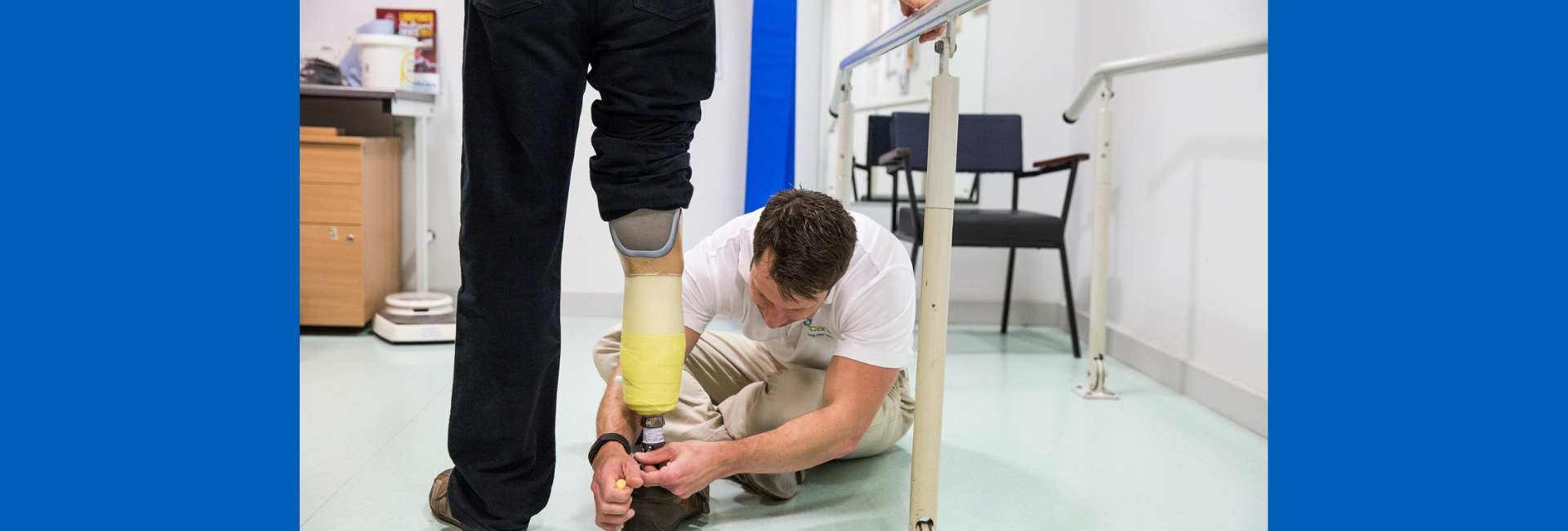
Prosthetists and orthotists
Prosthetists and orthotists help people move more easily and with less pain. Using the latest technology, they design and fit prosthetic limbs or supportive devices that allow patients to walk, run or stand more comfortably and confidently.

Introduction to the role
Prosthetists and orthotists both work to improve a person’s mobility and quality of life, but their roles are distinct. Prosthetists focus on designing and fitting artificial limbs for people who have lost a limb, helping them regain movement and independence. Orthotists work to correct issues affecting nerves, muscles and bones by creating supports such as splints or specialist footwear.
Both roles involve working closely with patients and other professionals to find the best possible solutions. You might support someone through a full rehabilitation journey after limb loss, offer guidance to surgeons during amputations, or help manage conditions such as arthritis or cerebral palsy.
About the role
What do prosthetists and orthotists do?
As a prosthetist, you’ll work with patients who have lost a limb, designing and fitting artificial limbs that help restore movement and independence. You’ll support people through rehabilitation and provide tailored solutions to meet their physical needs and lifestyle goals.
As an orthotist, you’ll assess and treat issues related to how the body moves, often linked to the nerves, muscles or bones. You might work with people living with long-term conditions such as cerebral palsy or arthritis, creating supportive devices like splints or specialist footwear that reduce pain and improve mobility.
Both roles are highly practical and patient-focused, using a mix of clinical knowledge and hands-on skills to improve quality of life. You’ll often work as part of a wider healthcare team, supporting patients at different stages of their treatment and recovery.
What are the pay and conditions like?
If you work as a prosthetist or orthotist in the NHS, you’ll usually be contracted for 37.5 hours a week. Your role may involve a mix of shift patterns, including early starts, evenings or weekends. Most roles start at band 5 on the Agenda for Change pay scale.
You’ll also benefit from access to the NHS pension scheme, staff discounts and 27 days of annual leave, plus bank holidays.
Some prosthetists and orthotists are employed by private providers working with the NHS. If so, your pay and conditions may vary depending on your employer.
Where a role as a prosthetist or orthotist can take you
Once you’ve qualified and registered with the Health and Care Professions Council, you can choose to specialise as either a prosthetist or an orthotist. Some roles may allow you to work across both areas.
You could:
- focus on areas such as sports injuries, diabetes, neurological conditions or paediatrics
- move into teaching, research or management
- develop your expertise through regular professional development and training
You’ll have ongoing opportunities to shape your career and build on your skills. You may also choose to join the British Association of Prosthetics and Orthotics to access additional training and support.
Life as an orthotist
Life as an orthotist
Person specification
Is prosthetics or orthotics right for you?
Working in prosthetics or orthotics is about more than designing aids or replacements. You’ll be helping people feel confident in how they move and live day to day. That means you’ll need strong communication skills and the ability to build trust with your patients, making sure they feel supported and understood throughout their care.
Ask yourself:
- Can I connect with people and help them feel at ease?
- Am I interested in both the physical and emotional impact of treatment?
Do you have the practical and technical skills?
You’ll need a strong technical mindset and the confidence to work with precision. This is a hands-on role where being comfortable with tools, measurements and adjustments is key. Maths skills are also important, as getting the right fit can require close attention to detail and calculation.
Ask yourself:
- Do I enjoy problem solving and practical tasks?
- Can I stay focused when working with detailed measurements and materials?
Find a course with UCAS
Want to explore the next step in traditional degree routes into the NHS? Explore courses related to prosthetics and orthotics with UCAS today.
Entry requirements and training
To become a prosthetist or orthotist, you’ll need to successfully complete an approved undergraduate or master’s degree in prosthetics and orthotics. The full-time undergraduate courses offered by a small number of universities in the UK typically take three or four years to complete. Once qualified, you must register with the Health and Care Professions Council before you can begin working in the role.
Most universities ask for two or three A levels, usually including maths, physics, biology or engineering, along with five GCSEs at grades 4-9 (A-C), including English language, maths and science. Equivalent qualifications may also be accepted, such as a BTEC or HND in a related subject, a relevant T Level or NVQ, a science-based access course, or a previous degree in a related field. Entry requirements vary by university, so it’s important to check directly with the provider.
You’ll also be expected to show how your values and approach to work reflect those needed in healthcare, particularly when applying through interviews or personal statements.
Apprenticeships
You can also train as a prosthetist or orthotist through a degree apprenticeship. This option allows you to work and earn a salary while completing your qualification. To be eligible, you’ll usually need to hold level 3 qualifications and meet the academic entry criteria for the course.
Apprenticeships are funded by your employer and the government, so tuition fees are covered. You won’t be eligible for student finance, but you will receive a wage throughout your training.
Find out more about routes into the NHS with UCAS.
Work experience
Applying for a course or apprenticeship as a prosthetist or orthotist is going to be competitive. If you're seriously considering it, it is a great idea to try and gain some prior work experience to strengthen your application. Visit NHS England to find out more about gaining work experience for careers in the NHS.
Financial help at university
You could receive at least £5,000 a year to help fund your studies while at university. Your personal circumstances and the course you choose may mean you could receive more. And the good news? You'll never have to pay it back.
Explore NHS Careers
There are over 350 different NHS careers and everyone makes a difference every day. Whether you’re still in education or thinking about changing careers, you'll get the information you need.